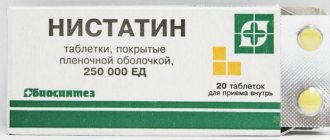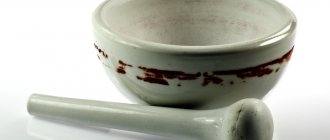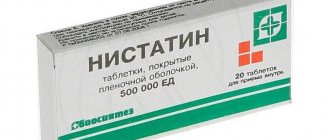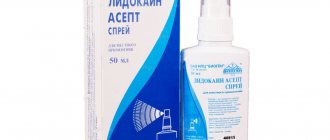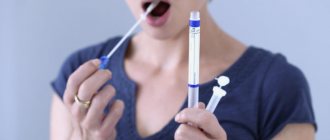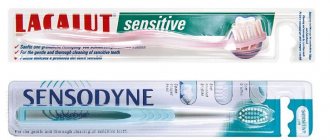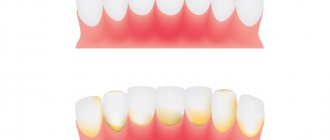The drug belongs to the subgroup of antifungal agents. Nystatin tablets are used to suppress the activity of fungus that affects the mucous membranes of the gastrointestinal tract, genitals, and oral cavity. The product is not suitable for patients under 13 years of age, pregnant or lactating women.
The medicine is made in tablets with a yellowish-greenish coating. Each contains 250 or 500 thousand units of nystatin. Additional components are presented:
- talc;
- hypromellose;
- titanium dioxide;
- calcium stearate;
- lactose;
- copolyvidone;
- tartrazine;
- vanillin;
- corn starch.
Nystatin inhibits the activity of Candida and Aspergillus. The active component is embedded in the membrane of mycotic cells and forms channels through which electrolytes flow. The result of the action is increased osmolar pressure, which disrupts the functioning of fungi. Getting used to the drug occurs slowly.
Composition and release form
| Film-coated tablets | 1 table |
| nystatin | 250000 units |
| 500000 units | |
| excipients: milk sugar; basic magnesium carbonate; OPMC; calcium stearate; potato starch; MC−16; titanium pigment dioxide; twin 80; Trolein O; Vaseline oil; vanillin |
in dark glass jars or polymer jars, 20 pcs.; in a cardboard pack 1 jar.
| Suppositories for rectal use | 1 sup. |
| nystatin | 250000 units |
| 500000 units | |
| excipients: parahydroxybenzoic acid propyl ester; food grade citric acid; Vaseline oil; vitepsol H-15; vitepsol W−35 |
in a blister pack 5 pcs.; in a cardboard pack 2 packs.
| Vaginal suppositories | 1 sup. |
| nystatin | 250000 units |
| 500000 units | |
| excipients: parahydroxybenzoic acid propyl ester; food grade citric acid; vitepsol N−15; vitepsol W−35 |
in a blister pack of 5 pcs.; in a cardboard pack 2 packs.
| Ointment | 1 g |
| nystatin | 100000 units |
| excipients: anhydrous lanolin; Vaseline medical |
in tubes of 30 g; in a cardboard pack 1 tube.
Adverse reactions and overdose
Unusual effects on Nystatin treatment may occur at high dosages of the drug. Patients complain:
- for attacks of nausea with vomiting;
- heartburn and diarrhea;
- painful sensations in the abdomen;
- feverish conditions accompanied by chills;
- nettle fever, redness, obsessive itching, skin rashes;
- dry nonproductive cough, tachycardia, soreness in muscle tissue.
The appearance of side effects requires a visit to the doctor and a change in the initial therapeutic regimen with a reduction in dosage. If the measures do not give the expected result, then the medication is discontinued.
Clinical manifestations of overdose appear in cases where the patient has consumed more than 5 million units of the drug per day. The patient experiences attacks of nausea, headache, and vomiting. Treatment consists of gastric lavage and taking activated carbon (1 tablet per 10 kg of weight). Nystatin therapy is discontinued.
Directions for use and doses
Inside, regardless of food intake. Adults: 500,000 units 4–8 times a day. For generalized candidiasis, the daily dose is increased to 6,000,000 units. Children aged 1 to 3 years - 250,000 units 3-4 times a day, over 13 years - 250,000-500,000 units 4 times a day. The course of treatment is 10–14 days. If necessary, the course can be repeated after a week.
Rectally, deep into the rectum, 1 suppository 2 times a day (morning and evening). The course of treatment is 10–14 days. The duration of treatment and the need for repeated courses is determined by the doctor.
Vaginally, after hygienic procedures - 250,000–500,000 units 2 times a day (morning and evening). The course of treatment is 10–14 days.
Locally, the ointment is applied in a thin layer to the affected areas of the skin and mucous membranes 1–2 times a day, daily for 7–10 days. Can be combined with taking the drug orally.
Indications and contraindications for Nystatin therapy
Treatment procedures for adult patients are prescribed for the development of candidiasis, affecting the mucous membranes of the esophagus, digestive tract and vagina. Nystatin therapy is carried out for skin lesions; the drug can be used to prevent the development of fungal infections in patients after antibiotic therapy, with weakened immunity or immunodeficiency.
The instructions allow the use of the medication in children over 12 years of age for the above indications. Tablets are not used during pregnancy due to the high risk of toxic effects. If medical procedures are needed by a nursing mother, then the child is weaned off the breast for the entire period.
Nystatin is contraindicated for people with individual intolerance to the component composition, with a gastrointestinal ulcer or systemic fungal infection.
Side effects
The instructions for the medication indicate that taking the medication orally can cause dyspeptic disorders and abdominal pain. According to reviews, the occurrence of these side effects is often observed when using rectal suppositories, while treatment with vaginal suppositories is fraught with the development of an allergic reaction. Regardless of the dosage form, the drug may cause the following side effects:
- itching;
- chills;
- hyperemia of the skin;
- temperature increase.
Drug interactions
Due to the fact that Nystatin does not enter the circulatory system, does not have a transformation effect and is not able to accumulate in the body, it practically does not interact with other drugs. The only exceptions are some medications with which the antifungal drug can bind, thereby losing its own activity or reducing the effectiveness of a particular drug.
How to take Nystatin with antibiotics
The simultaneous use of an antimycotic and Tetracycline tablets has a positive effect on the human body. This “tandem” has a pronounced antimycotic and antifungal effect, and therefore helps to effectively fight a variety of diseases. The combined use of Clotrimazole and Nystatin negatively affects the activity of the former. In addition, it is not recommended to simultaneously take an antifungal drug with penicillins and cephalosporins: the antimycotic reduces the effectiveness of these groups of antibiotics.
Nystatin during pregnancy
Pregnancy is a predisposing factor for the development of vulvovaginitis . The main thing in this situation is the safety of treatment. The instructions include contraindications for the use of nystatin during pregnancy, since there is no information about their safety for the fetus. Nystatin suppositories can be used during pregnancy only in exceptional cases when the benefit to the mother outweighs the risk to the fetus. Reviews from forum visitors confirm that the drug in this form is sometimes prescribed to pregnant women for short courses of treatment.
The use of ointment is contraindicated during pregnancy. However, it has been proven that the active substance is not excreted in milk when used externally, so breastfeeding can be continued during treatment with the ointment. Do not apply the ointment to the area of the mammary gland and nipple.
Note!
Description of the drug Nystatin-Zdorovye Susp. yelled 100000 IU/ml vial. 50ml on this page is a simplified author’s version of the apteka911 website, created on the basis of the instructions for use.
Before purchasing or using the drug, you should consult your doctor and read the manufacturer's original instructions (attached to each package of the drug). Information about the drug is provided for informational purposes only and should not be used as a guide to self-medication. Only a doctor can decide to prescribe the drug, as well as determine the dose and methods of its use.
Price
The cost of the drug is largely determined by its release form. Thus, the price of Nystatin tablets in pharmacies varies between 20-25 rubles, while, for example, suppositories with a similar active substance cost 2-3 times more. At a lower cost, the drug can be ordered in virtual pharmacies, according to the catalog presented on such sites. Remember: medications purchased from online stores with a suspicious reputation often do not have the effects stated in the instructions.
Check prices for Nystatin in Moscow pharmacies in advance - they are shown in the table:
| Release form | Price, rubles |
| Nystatin TB 250000IU N20 | 14-16 |
| Nystatin TB 500000IU N20 | 20-27 |
| Nystatin suppositories vag. 250 mg No. 10 | 22-25 |
| Nystatin suppositories vag. 500 thousand units No. 10 | 59-63 |
| Nystatin sup. rectal 250000 units strip, 10 pcs | 149-155 |
| Nystatin sup. rectal 500000 units contour. cells pack, 10 pcs. | 188-195 |
| Nystatin ointment 100000 units/g 15g | 41-43 |
| Nystatin ointment 100000 units/g 30g | 73-88 |
| Nystatin gran.d/susp. 100000U/ml 7.5 g/50 ml | 138-142 |
Contraindications
An absolute contraindication to taking nystatin suppositories is hypersensitivity to the active ingredient. Do not use the product during pregnancy.
Suppositories with targeted antimycotic action are not prescribed for liver dysfunction. Contraindication is exacerbation of pancreatitis. The product is approved for use only from the age of 18 years. This is due to the fact that the drug has not been tested for its effect on the child’s body.
During lactation, there are no restrictions on the use of nystatin suppositories. The active component enters the bloodstream in small quantities; therefore, no traces of it were found in breast milk. When treating suppositories with nystatin, you do not need to stop breastfeeding.
Analogs
When the use of Nystatin is impossible due to individual intolerance to the components of the drug or other reasons, specialists resort to prescribing medications with identical pharmacological effects. All medications used to treat fungal infections are classified as antibiotics, and therefore must be used strictly in accordance with the regimen prescribed by the doctor. The following analogs of Nystatin are used in pediatric practice:
- Fungostatin;
- Leforin;
- Mycostatin;
- Oflosaccin;
- Anticandin.
Features of interaction and special instructions
The drug is not absorbed through the mucous membranes and does not penetrate into the blood, does not accumulate and does not undergo biotransformation processes. It may react with certain drugs:
- with Tetracycline – complement each other, suppress the activity of microbial and fungal infections;
- Clotrimazole – the effectiveness of the drug is noticeably reduced;
- Nifuratelom and Polymyxin - both drugs improve the functioning of Nystatin;
- anacids containing calcium, aluminum and magnesium - the activity of Nystatin decreases;
- indirect coagulants - increased dosage is required for Warfarin, Coumadin, Phenindione, etc.;
- penicillin and cephalosporin antibiotics, oral contraceptives with estrogen - the effectiveness of additional medications is reduced.
Homotrypsin improves the results of Nystatin, and combination with retinol drugs can increase intracranial pressure.
The manufacturer warns that the product may cause increased sensitivity to the sun in patients. When undergoing therapeutic procedures, prolonged contact with ultraviolet rays must be avoided. The medicine is contraindicated and is not used for systemic fungal infections.
Peculiarities
Nystatin suppositories, which are affordable, are intended for intravaginal and rectal administration in the treatment of thrush and vaginitis. They are distinguished by their cylindrical shape, which simplifies their use. The drug belongs to the group of drugs with fungistatic effects.
The active component of the drug is nystatin. The substance has an antimycotic effect. Its greatest activity is observed against fungi of the genus Candida. After using the drug, the active component disrupts the permeability of cell membranes, after which the fungal cells die.
Purpose
Nystatin suppositories are prescribed, the instructions indicate this, when diagnosing candidiasis of the vaginal mucous membranes. When the disease worsens, severe unpleasant symptoms occur: itching, burning, redness, swelling. Additionally, abundant curd-like discharge from the vagina appears. In the absence of proper treatment, candidiasis can lead to the development of serious inflammatory processes that will require complex and lengthy treatment.
Since very often the cause of thrush is a decrease in immunity, the drug is prescribed as a prophylactic agent. In particular, nystatin suppositories are indicated for use in cases of hypothermia for a long time. The product should also be used during periods of treatment for various diseases with antibiotics and corticosteroids. It is also recommended to use nystatin suppositories for dysbacteriosis.
Suppositories are also prescribed for rectal use in the diagnosis of mycotic lesions of the mucous membrane of the rectum and large intestine. The medicine is indicated after operations on the intestines. The drug is prescribed as an additional agent in the complex treatment of various diseases, in particular trichomoniasis and chlamydia.
